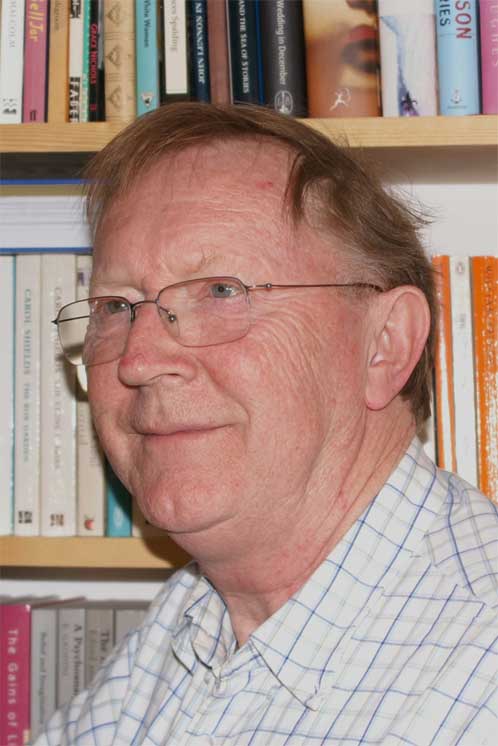Michael Jacobs

Michael Jacobs was born in 1941. He was educated at Dulwich College and Exeter College Oxford; and then attended Chichester Theological College before being ordained in 1965. Having served in a parish in Walthamstow, he was interdenominational chaplain at the University of Sussex from 1968–1972, during which time he started practising as a therapist with support from the Student Health Service, then headed by Anthony Ryle. In 1972 he was appointed psychotherapist and counsellor at the University of Leicester Student Health Service, and trained on the clinical psychology psychotherapy course at the Tavistock Clinic in London. After twelve years in the Student Health Service, he moved to the Department of Adult Education, where he was developing a counselling training, which went on to include a psychotherapy training. Alongside this he played a significant role in the development of the British Association for Counselling and Psychotherapy and the Universities Psychotherapy and Counselling Association. He is a fellow of the British Association for Counselling and Psychotherapy, a Fellow of the National Society for Counselling and Psychotherapy and an honorary fellow of the Bath Centre for Psychotherapy and Counselling. He had his first book published in 1982 and has since written or edited over sixty books for a number of publishers. Following a stroke in 1999 he retired from the University of Leicester, and moved to Swanage where for a number of years he was Visiting Professor at Bournemouth University. Apart from his writing and teaching he conducted a small practice of therapy and supervision. He continued also to lead workshops largely devoted to his interest in the development of thinking and belief, and psychoanalysis and film. Studying for another degree he was awarded first class honours by the Open University, and went on to complete a PhD comparing psychoanalytic and literary criticism of A Midsummer Night’s Dream.
Michael has been married three times, separating from his first wife Valerie in 1989, and marrying Moira Walker. They worked together on various series and teaching at Leicester and Bournemouth Universities. Following her early death in 2013, Michael married Pamela Howdle-Smith, with whom he now enjoys a more complete retirement, in which they appreciate music, literature, fine food, and reflecting on their earlier busy lives in teaching and therapy. He has two daughters by his first marriage, two grandchildren, and two great-grandchildren.
Reflecting on Therapy
Michael Jacobs is the author of key texts, such as Psychodynamic Counselling in Action and The Presenting Past. Looking back over fifty years’ experience as a therapist and reflecting on some forty... (more)
Psychodynamic Counselling in Action: Sixth Edition
This classic text demonstrates psychodynamic theory and practices across the counselling process beginning – middle - end. This revised sixth edition includes a new preface, updated further reading... (more)
D.W. Winnicott
Presents the life, theoretical contributions, and legacy of Donald Winnicott who, as well as a psychoanalyst, was also a child psychologist and paediatrician. The book explains in detail the... (more)
Swift to Hear: Facilitating Skills in Listening and Responding
The author describes the development of basic listening and responding skills, and the process of communication which is at the heart of the helping interview. Numerous exercises make this an... (more)
Still Small Voice: An Introduction to Pastoral Counselling
This volume which offers an introduction to pastoral counselling, has been fully revised and updated to take account of advances in the theory and practice of pastoral counselling. (more)
Addiction: Questions and Answers for Counsellors and Therapists
This text is written in a question-and-answer style, with several types of reader in mind. It is intended primarily as a source of help for established counsellors and therapists, who wish to enhance... (more)
Supervision: Questions and Answers for Counsellors and Therapists
Supervision is a prerequisite for all counsellors, and for most psychotherapists, yet until recently it has been assumed that any experienced counsellor or therapist could become a supervisor without... (more)
Shakespeare on the Couch
Drawing upon a vast literature in psychoanalytic journals and either upon Shakespeare's characters themselves or alluding to those characters in the course of other topics, this book discusses eight... (more)
Our Desire of Unrest: Thinking About Therapy
Knowledge is never static. It is always open to revolutionary thinking or to evolving development. Similarly an individual's knowledge is always moving, and indeed if the ability to think about ideas... (more)
The Therapist's Use of Self
This volume deals with what is perhaps the central question in therapy - who is the therapist? And how does that actually come across and manifest itself in the therapeutic relationship? A good deal... (more)
Sigmund Freud
Part of the "Key Figures in Counselling and Psychotherapy" series, this text considers the life, contributions and influence of Sigmund Freud. Freud's influence on psychodynamic counselling is... (more)












